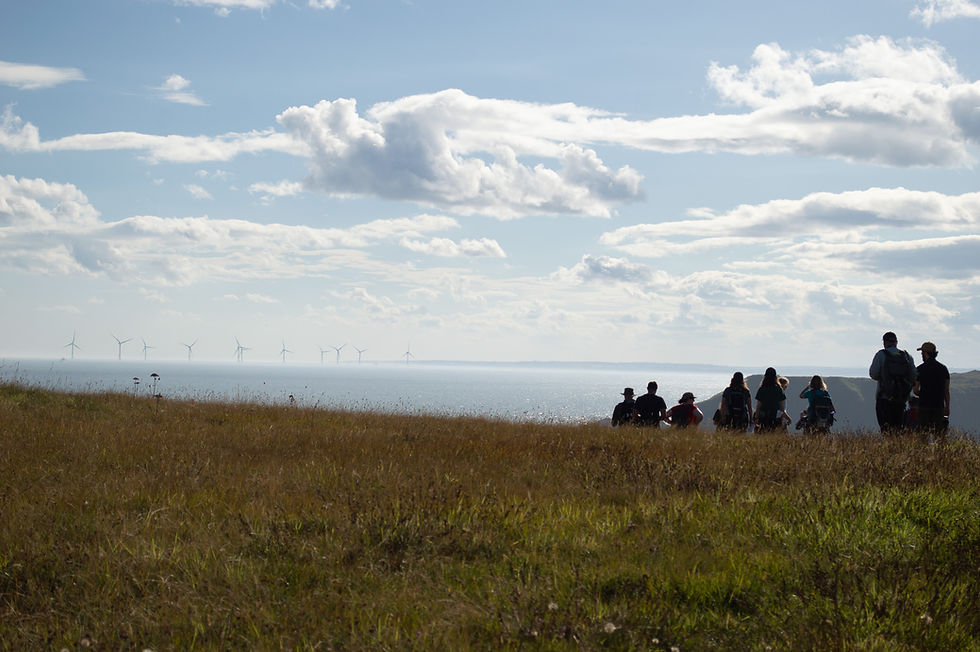Bolstering nature regeneration through innovation in tourism and land management
- MOYO Training
- Oct 21, 2024
- 4 min read
Updated: Jul 9, 2025

Elliott Gansner, entrepreneur and founder of a tourism enterprise dedicated to supporting nature restoration, joined our Nature Positive Tourism Field Training in Italy last year. We recently caught up with him to find out more about his project, and how he is applying what he learnt through the training to support its progression.
Travel for a greener future
Terra Regen Tourism was inspired by his wife, an investor in regenerative agriculture, and combines Elliott’s love for the wild with his background in real estate development. He had noted the growing concept in the States of ‘Landscape Hotels’, which immerse guests in natural environments. Terra applies this to areas with ongoing nature restoration projects — giving guests an opportunity to learn about regeneration, contribute directly to supporting the project and even lend a hand to the work in the field.
Elliott and his team are currently developing a network of small landscape hotels in areas of Spain with active rewilding projects and on regenerative farms. Via a “terra tithe” fee that is donated to partner NGOs, Terra contributes to the regeneration of rural and wild Iberia, by sharing the economic value generated by the hotels to fund these projects and farmers.

Attitudes towards nature
Having previously lived in Oregon, US, Elliott explained he was accustomed to paying for access to nature — with permits required to visit local, state and national parks and forest lands. So, when he moved to Spain, he realized that attitudes towards nature are starkly different in Europe — a notion that was cemented through the field training program. Whilst having free access to nature is something valued by many for the myriad of benefits it brings, Elliott reckons that having a nominal fee to access some areas could be advantageous from a behavioural psychology perspective — encouraging more appreciation, respect and stewardship for nature and the services it provides.
A balancing act
Providing opportunities to proactively understand, appreciate and contribute to nature restoration is critical in inspiring more people to care for our environment. However, taking them into these areas, which are often sensitive and protected areas, brings its own challenges and requires extremely careful consideration and planning. It’s a balancing act of enabling a fully immersive experience, but with sustainable and ethical practices — and ultimately, positive outcomes.
Innovation in land management
There are rural areas within Europe, particularly in Spain, that would have historically been hives of activity — conjuring images of shepherds herding goats and sheep, and loggers felling forests. But the shift towards more intensive agricultural methods and urbanization in recent times has resulted in much of that land becoming abandoned and wild. Whilst that might not sound like a bad thing on the surface, because these landscapes have been altered by humans for so long, it’s not always possible for nature to regenerate itself. Elliott explained that this presents a huge opportunity to manage depopulated lands in a new innovative way, that would not only help to restore nature but could be a new nexus for economic development for rural communities.
Community engagement is the key
One of Elliott’s key takeaways from the field training program was learning that changing anything in communities, especially small communities, can be difficult. Being cognizant of people’s opinions and natural reactions/reluctance to change, due to fear and negative associations, is critical. The training teaches, therefore, that an important element of nature positive tourism is how to proactively engage communities in discussions and decision making, making them feel heard and comfortable — whilst showing them the positives of what you are trying to achieve.
A wild encounter
Elliott recalls one of his most prominent memories from the training was hearing a pack of wolves howling, only a stone's throw away from a well populated town that they had not long departed from. It was a reminder of the importance of human and wildlife connection and how, when managed well, it is possible for us to coexist.
Setting intentions and aspirations

Elliott told us that the best way to prepare for the training is to go with a clear idea of what you want to get out of the experience and armed with questions to ensure areas where you most need support are covered during the program. He mentioned that as he’s progressing with his project, he continues to seek input from our co-founders, Simon and Aukje, which he has found to be invaluable.
So, know that when you participate in MOYO’s training program, you become part of a network of like-minded people that will continue to support you on your journey to becoming nature positive!
Would you like to learn more about our Nature Positive courses?
Sign up for our Online Training or Field Training.

Written by Hayley Whyte







Comments